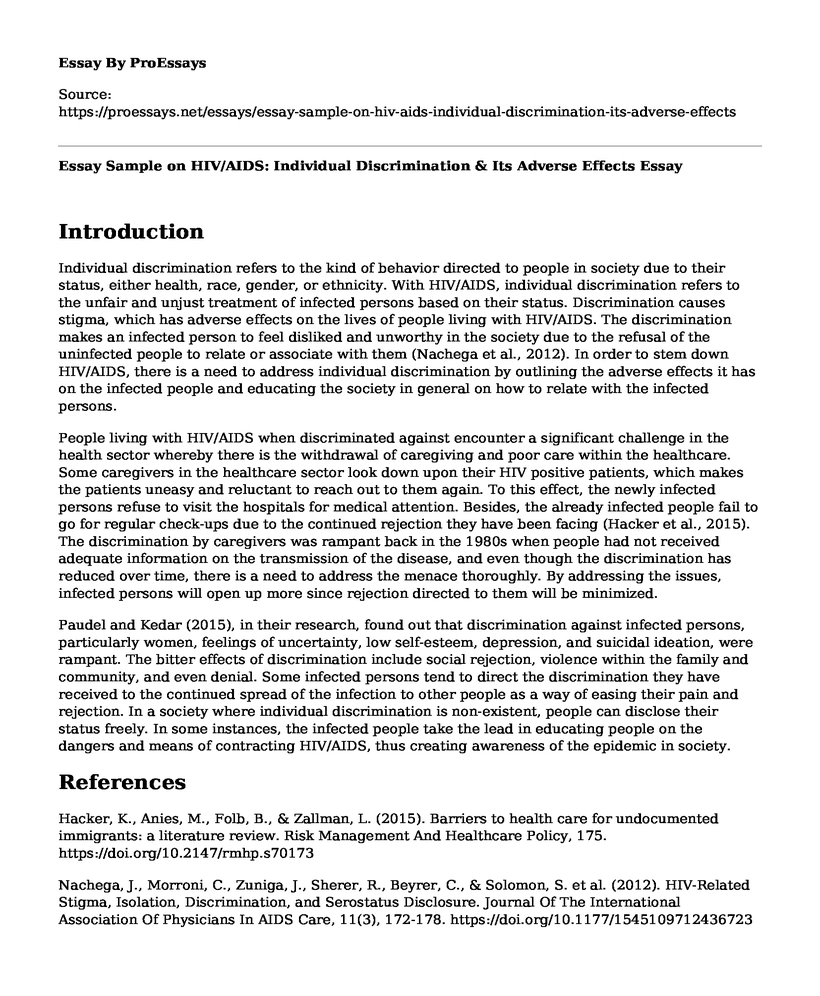Introduction
Individual discrimination refers to the kind of behavior directed to people in society due to their status, either health, race, gender, or ethnicity. With HIV/AIDS, individual discrimination refers to the unfair and unjust treatment of infected persons based on their status. Discrimination causes stigma, which has adverse effects on the lives of people living with HIV/AIDS. The discrimination makes an infected person to feel disliked and unworthy in the society due to the refusal of the uninfected people to relate or associate with them (Nachega et al., 2012). In order to stem down HIV/AIDS, there is a need to address individual discrimination by outlining the adverse effects it has on the infected people and educating the society in general on how to relate with the infected persons.
People living with HIV/AIDS when discriminated against encounter a significant challenge in the health sector whereby there is the withdrawal of caregiving and poor care within the healthcare. Some caregivers in the healthcare sector look down upon their HIV positive patients, which makes the patients uneasy and reluctant to reach out to them again. To this effect, the newly infected persons refuse to visit the hospitals for medical attention. Besides, the already infected people fail to go for regular check-ups due to the continued rejection they have been facing (Hacker et al., 2015). The discrimination by caregivers was rampant back in the 1980s when people had not received adequate information on the transmission of the disease, and even though the discrimination has reduced over time, there is a need to address the menace thoroughly. By addressing the issues, infected persons will open up more since rejection directed to them will be minimized.
Paudel and Kedar (2015), in their research, found out that discrimination against infected persons, particularly women, feelings of uncertainty, low self-esteem, depression, and suicidal ideation, were rampant. The bitter effects of discrimination include social rejection, violence within the family and community, and even denial. Some infected persons tend to direct the discrimination they have received to the continued spread of the infection to other people as a way of easing their pain and rejection. In a society where individual discrimination is non-existent, people can disclose their status freely. In some instances, the infected people take the lead in educating people on the dangers and means of contracting HIV/AIDS, thus creating awareness of the epidemic in society.
References
Hacker, K., Anies, M., Folb, B., & Zallman, L. (2015). Barriers to health care for undocumented immigrants: a literature review. Risk Management And Healthcare Policy, 175. https://doi.org/10.2147/rmhp.s70173
Nachega, J., Morroni, C., Zuniga, J., Sherer, R., Beyrer, C., & Solomon, S. et al. (2012). HIV-Related Stigma, Isolation, Discrimination, and Serostatus Disclosure. Journal Of The International Association Of Physicians In AIDS Care, 11(3), 172-178. https://doi.org/10.1177/1545109712436723
Paudel, V., & Baral, K. (2015). Women living with HIV/AIDS (WLHA), battling stigma, discrimination and denial and the role of support groups as a coping strategy: a review of literature. Reproductive Health, 12(1). https://doi.org/10.1186/s12978-015-0032-9
Cite this page
Essay Sample on HIV/AIDS: Individual Discrimination & Its Adverse Effects. (2023, Apr 10). Retrieved from https://proessays.net/essays/essay-sample-on-hiv-aids-individual-discrimination-its-adverse-effects
If you are the original author of this essay and no longer wish to have it published on the ProEssays website, please click below to request its removal:
- STI in Teenagers in the State of Hawaii Essay
- Essay Sample on Role of Nurses in the Recovery Process of PTSD Patients
- Multi-Agency Emergency Event Paper
- Essay on Patients & Physicians Perspectives on New Tech for CAN Detection in Diabetes Clinics
- Essay Sample on Change from Pediatrics to Psychiatry: Reasons for a Career Shift
- Covid-19: A Potent Coronavirus Ravaging the World - Essay Sample
- Varicella-Zoster Virus: Understanding Immunity & Vaccine Effectiveness - Research Paper







